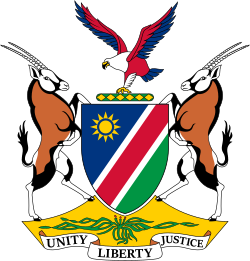National Assembly | |
|---|---|
| 8th National Assembly | |
 | |
| Type | |
| Type | of the Parliament of Namibia |
| History | |
| Founded | 21 March 1990 [1] |
| Leadership | |
| Structure | |
| Seats | 104 |
 | |
Political groups | Government (59) Appointed members (8) Official opposition (20) Other parties (25) |
Length of term | 5 years |
| Elections | |
| Closed list proportional representation and appointments by the President | |
Last election | 27–30 November 2024 |
Next election | 2029 |
| Meeting place | |
 | |
| Tintenpalast, Windhoek, Khomas Region, Namibia | |
| Website | |
| Parliament of Namibia | |
 |
|---|
The National Assembly is the lower chamber of Namibia's bicameral Parliament. Its laws must be approved by the National Council, the upper house. Since 2014, it has a total of 104 members. 96 members are directly elected through a system of closed list proportional representation and serve five-year terms. [2] Eight additional members are appointed by the President. Since March 2025, SWAPO member Saara Kuugongelwa has been the Speaker of the National Assembly. [3]
Contents
Namibia's National Assembly emerged on Independence Day on 21 March 1990 from the Constituent Assembly of Namibia, following the elections of November 1989. That election, under guidelines established by the United Nations, included foreign observers in an effort to ensure a free and fair election process. The current National Assembly was formed following elections on 27 November 2024.